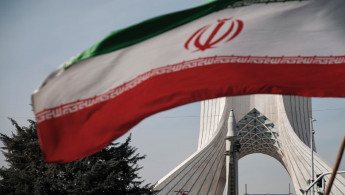BBC report: Israel was the only country to foresee Iran revolution
Iran under the rule of Mohammad Reza Pahlavi, also known as Mohammad Reza Shah, was a close ally of Israel after a CIA and MI6-backed coup in 1953 installed him as leader. Tehran meanwhile faced cold relations and a boycott from most Arab states, with the notable exception of Egypt, as there was an ongoing peace process between then-president Anwar Sadat and the Shah.
According to confidential documents released on Thursday, the UK confirmed that Israel anticipated the Shah’s downfall before Western countries, including Britain, the United States and France, who had misjudged it.
Nicholas Brown, a British diplomat by order of the Foreign Secretary, revealed that Israel, which was keen on the survival of the Shah's regime, was the only state that predicted, through much information gathering, that the clerical opposition was a severe danger at that time.
"There were indications that the Israeli government adopted a pessimistic view about the Shah's future some time before the West got there," according to Brown’s final report.
The Israeli mission in Tehran reportedly began advising Tel Aviv in early 1974 that it should reduce its heavy reliance on Iranian oil supplies, while the head of the mission advised Israeli businessmen to "avoid long-term investments" in projects in Iran.
|
The West’s miscalculation
Sir Anthony Parsons, the British ambassador to Tehran at the time, gave similar warnings to British businessmen. However, until a few months before the revolution, he assured his government that the Shah’s regime was secure thanks to the support of the armed forces and the inability of the opposition to overthrow him. Britain was getting 11 percent of its oil from Iran at that time.
While Britain miscalculated the threat to the Shah, in March 1978, the Israeli ambassador raised a warning of the imminent victory of the revolution to Moshe Dayan, the Israeli foreign minister.
Brown’s report, which is based on various declassified British documents and meetings with former CIA officials, now confirms the Israeli ambassador’s account.
The CIA officials claimed that Washington did not see the revolution coming as there "a lack of information on the clergy and merchants, and a misunderstanding of the consequences of the economic setbacks." Britain and the US also did not fully understand how unpopular the Western-backed Shah was in the country.
Even the Soviet Union “was expecting the Shah to survive and continue in power," according to the report.
Despite its close relations with the US, Israel did not warn Washington about the impending danger.
Brown revealed that the Israeli ambassador said that Tel Aviv “debated whether they should inform the Americans to do something. However, in the end, they took no action.”
The report coincided with the 42-year anniversary of the victory of the Iranian revolution on Thursday, which Ayatollah Ruhollah Khomeini led after uniting clerics, leftists and liberals.
The Shah governed Iran with an iron-fist, and his ambitious economic policies are considered to have widened inequality, while he spent lavishly on boosting Iran’s military prowess.
Khomeini then oversaw the Islamic Republic of Iran, which developed a more antagonistic policy towards the US and Israel, whom he called “The Great Satan” and “Little Satan” respectively.
Follow us on Facebook, Twitter and Instagram to stay connected





 Follow the Middle East's top stories in English at The New Arab on Google News
Follow the Middle East's top stories in English at The New Arab on Google News
![Both Hamas and the Palestinian Authority welcomed the ICC arrest warrants [Getty]](/sites/default/files/styles/image_330x185/public/2024-11/GettyImages-2178351173.jpg?h=199d8c1f&itok=TV858iVg)

